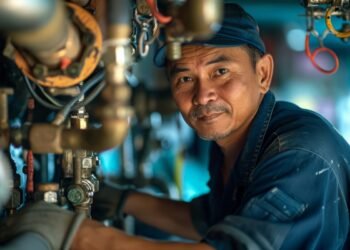Manufacturers of forgings in India industry lifts capability with advanced machinery, fewer workforce, and skill development plans.
The forging sector of India is one of the largest sectors within the manufacturing landscape, and it is playing a fundamental role in serving the needs of the domestic market as well as of global supply chains.
It caters to industries such as automotive, aerospace, construction, defense, and agriculture, making India one of the foremost forging producers worldwide.
It is the Indian government with forging companies, taking leading roles in concrete measures toward the efficiency of the industry in bettering the present demand for quality forgings.
5 Ways India is Improving Efficiency of Forging Manufacturers
This is achieved through modernization, infrastructure growth, financial support, and environmental sustainability. Here’s how India boosts the efficiency of its forging manufacturers:
#1. Quicker and Easy Manufacturing Loans
Affordable quick finance is another critical factor that has enabled forging manufacturers India to improve operational efficiency. The government and financial institutions have launched various schemes and incentives that assist manufacturing companies to acquire loans fairly easily and at lower interest rates.
This is particularly true for a forging company where the scope of capital investment in machines, infrastructure, and workforce training is quite high to remain competitive. In the same way, there have been schemes like Credit Linked Capital Subsidy Scheme (CLCSS), Make in India, and Atmanirbhar Bharat, or Self-Reliant India, facilitating easy loans and financing to small and medium-sized forging units.
Those would facilitate investment in modern technologies and capacity build-up towards high productivity and efficiency. With easy and cheap availability of credit, forging companies can invest in automation, digitalization, and high-end equipment-essential to achieve quick production cycle times as well as enhanced efficiency in the operations at large.
Removing financial bottlenecks, India is ushering forging manufacturers to quickly respond to market needs for competitiveness in global markets.
Also Read: How Forging Manufacturers in India Ensure Quality Assurance
#2. Promoting Eco-Friendly Practices
Indian forging firms are increasingly embracing green practices due to global trends in sustainable manufacturing. Such initiatives are reinforced by governmental policies that guarantee environmentally conscious manufacturing, saving energy, and minimizing waste.
The use of clean sources of energy and embracing efficient production approaches have further helped the forging companies reduce carbon footprints while enhancing operational performance. India is home to many forging companies which have on boarded the concept of adopting heat recovery systems, energy-efficient furnaces, and waste heat utilization.
These technologies allow the company to save energy in forging operations, minimize raw material waste, and reduce emissions. Companies’ focus on cutting waste has led the companies to rethink their production processes by integrating sustainability into business models.
Indian forging companies are becoming more and more accustomed to using green lubricants and water-based solutions with the forging process such that environmental impact is reduced and products of high quality are maintained. The advantage of this initiative in terms of cost efficiency and smooth operations will automatically rank it to international standards of sustainability.
Also Read: The Ultimate Step-by-Step Guide to Forging Metal Components
#3. Building Infrastructure for Quicker Transport
One critical enabler of improvement of the efficiency of India’s forging manufacturers is the creation of strong infrastructure supporting raw material and product delivery with minimal logistics cost and lead times. The Government of India has realized this requirement and is focused on developing better roads, rail networks, and ports, which reduce logistics costs and lead times.
The Bharatmala Project and Sagarmala Initiative are representative of India’s more ambitious large-scale infrastructure programs aimed at improving connectivity and the efficiency with which it could run its supply chains. Among large infrastructure projects modern highways, expressways, and freight corridors are concentrated to enable forging manufacturers to easily and efficiently transport goods across very vast regions.
Availability of dependable as well as efficient transport networks also assists forging companies to gain easy access to global markets, ultimately strengthening export capabilities. Shorter transit times, reduced freight costs, and fewer logistics bottlenecks help forge companies concentrate on increasing production efficiency and meeting tight delivery schedules.
Also Read: Top 7 Ways to Find the Best Forging Manufacturers
#4. Importing Forging Machines
Import of sophisticated forging machines from other countries is another crucial strategic step through which Indian forging manufacturers have come out to enhance their effectiveness. The companies in India are importing the latest advanced equipment from foreign countries like Japan, Germany, and the United States, for which these countries are known for being technological forgers in the equipment used.
These imported machines usually comprise the latest advanced innovations in precision forging, automated material handling, and closed-die forging technologies that enable manufacturers to produce quality components at faster rates and with much higher accuracy. The availability of advanced machinery has greatly reduced manual intervention; thus, the errors are lower, and the quality control is better with much shorter cycles.
Moreover, the policies of the country, letting in reduced import duties for specialized machinery and capital goods have made it easier for forging companies to get the latest machines and apparatus. The latter can make more within less downtime and with reduced operational costs by using advanced foreign technologies, hence improving efficiency overall.
Also Read: How can forgings manufacturers improve product lines
#5. Making Use of Advanced Tools and Machinery
There are Indian forging manufacturers coming out embracing state-of-the-art tools and machinery to streamline their manufacturing process and boost up their productivity. Such high-end CNC (Computer Numerical Control) machines, from the comfort of robotic systems that can function on complex and repetitive jobs with high precision and speed.
CAD and CAM technologies have also gained wide acceptance in forging operations to enhance designs and developments of tools and dies, prevent wastage of resources, and ensure high-quality products. This has tended to allow the forging manufacturers to have improved processes with a better utilization of the material and reduced downtime cases due to tool failure or tool breakdown.
Apart from automation, Indian forging companies are using real-time data analytics and IoT for the monitoring of the production performance of their facility and identification of bottlenecks to improve the predictive maintenance strategy. Data-driven insights enable manufacturers to focus on predictive solutions that solve issues before they impact production, ensuring that machines perform at peak efficiency and that maintenance costs are optimized.
These advanced tools and technologies have transformed a traditional forging process into an easy-going and efficient operation, thus allowing Indian forging manufacturers to come up with quality component requirements in the automotive, aerospace, and energy segments and more.
Related: 5 Challenges faced by Forging Suppliers in India
Conclusion
Combination of government support and the availability of finances, advancements in technology, and sustainability efforts have contributed to speedy progress in India’s forging industry.
Quicker and easy loans, promoting eco-friendly practices, developing better infrastructure, bringing into the country advanced forging machines, and using cutting-edge tools and technologies are ways to keep India’s forging manufacturers competitive enough in the global market.
As this industry continues to modernize and innovate, Indian forging manufacturers should well be positioned to meet the ever-increasing global demand for forged components. Keeping up the current level of efficiency and sustaining this growth in India’s economy, the future prospects of forging manufacturing look bright in terms of efficiency and sustainability.




















